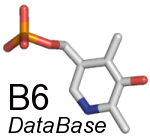|
|
| type |
Journal Article |
| authors |
Wang D, Fan J, Ranu RS. |
| title |
Cloning and expression of 1-aminocyclopropane-1-carboxylate synthase cDNA from rosa (Rosa x hybrida) |
| journal |
Plant Cell Rep |
| Activity |
4.4.1.14 |
| Family |
4.4.1.14.a |
| sel |
selected |
| ui |
14579075 |
| year |
(2004) |
| volume |
22 |
| number |
6 |
| pages |
422-9 |
| | |
|---|
| keywords |
Amino Acid Sequence |
| abstract |
The role of 1-aminocyclopropane-1-carboxylate (ACC) synthase in rose flower petal senescence was investigated. A cDNA library from senescing petals of rose ( Rosa x hybrid cv. Kardinal) prepared in lambdacDNA ZAP Express Vector was probed with a rose-specific 400-bp probe, and seven putative positive ACC synthase clones were isolated. Except for differences in length, the sequences of these clones were identical. A full-length clone, RKacc7, 1,750 bp long, coded for an open reading frame of 480 amino acids that contained the 11 conserved amino acid residues, the substrate and pyridoxal 5'-phosphate binding sites, all of which are characteristic of all ACC synthases. The transcripts prepared in vitro from the full-length clone when translated in rabbit reticulocyte lysates exhibited a 55-KDa polypeptide that comigrated with a polypeptide synthesized from a mRNA fraction isolated from senescing petals, and both were immunoselected by anti-ACC synthase antibodies. Reverse transcriptase-PCR-based studies showed that in planta RKacc7 is specifically expressed in rose petals, ovary and sepals. The expression of ACC synthase increased dramatically as the flower matured to senescence and also correlated positively with ethylene levels. The results of genomic Southern blots probed with RKacc7 are consistent with a pattern expected from a multigene family. |
| last changed |
2018/11/27 10:24 |
|











